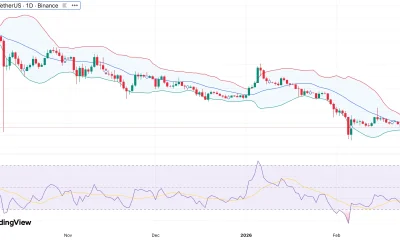HARRISBURG, Pa. (AP) — Sofia Tepichin was about 30 minutes into her club soccer team practice in October when she spotted a fast-approaching defender. She tapped the ball away and hopped over the defender’s outstretched foot, came down awkwardly, and heard a “pop.”
She immediately fell to the ground, pain shooting through her left knee and knew it wasn’t good. It was, she said, “heartbreaking.”
“And I knew personally that I tore my ACL,” Tepichin said.
Tepichin joined the growing ranks of female high school athletes tearing their anterior cruciate ligament, a devastating knee injury that researchers are pressing the sports world to take more seriously.
Decades of research on prevention methods is available, but parents, researchers and trainers say that teams, coaches and leagues aren’t doing enough to protect the girls and educate parents.
High school female athletes are most vulnerable
Sports fans hear often about high-profile athletes like U.S. Olympic skier Lindsey Vonn tearing their ACLs, and many ACL injuries are chalked up to bad luck or a part of sports that will continue to happen at all competitive levels.
Still, high school-age female athletes suffer these injuries at much higher rates than their male counterparts — up to eight times more likely, one study says — and adults, most often in noncontact situations in sports that require fast changes in direction, researchers say.
Biomechanics researchers, trainers and physical therapists say there are pre-workout warm ups and strengthening routines — such as FIFA 11+ or PEP — that can at least reduce the risk of an injury that takes such a high physical and mental toll on young athletes.
But, they say, most coaches lack training or expert help, and high school girls compete in settings with far fewer resources than the professional and collegiate levels. As a result, risk-reduction routines are rarely included in day-to-day coaching curricula and practices.
“The real crime in this is that the data has been out there for 25 years,” said Holly Silvers-Granelli, a physical therapist and biomechanics researcher who advises athletes, professional teams and major sports leagues on injury prevention. “People are clamoring for answers, and the answers are largely there.”
The trendline of ACL injuries isn’t entirely clear, but the National ACL Injury Coalition — formed by the Aspen Institute and the Hospital for Special Surgery in New York — said its analysis of data from high school athletic trainers showed that the average annual ACL injury rate for high school athletes grew almost 26% from 2007 to 2022.
The rate for girls grew more than 32%, compared to 14.5% for boys, it said.
On their own to recover
When they get injured, high school athletes and their parents often find themselves on their own to deal with it. ACL injuries can require surgery and a year of rehab, physical therapy and strength training, which insurance may not fully cover.
Recovery changes their routine and identity: They miss out on the camaraderie of the team and stand on the sidelines, which can be as hard as the physical trauma, parents say.
Many high school athletes who tear their ACL never perform again at the same level, if they even return to the sport, the National ACL Injury Coalition says. And once injured, they carry a heightened risk of another ACL injury and long-term complications like degenerative joint disease, researchers say.
The coalition has urged the sports world to treat ACL injuries like brain injuries, now that professional and youth sports have tried to improve training, rules and equipment standards to prevent and detect concussions.
Sophia Gerardi, a sophomore at Pennsylvania’s Apollo Ridge High School who tore her ACL during a basketball game in December, was told by her doctors that she’ll forever have to wear a knee brace to play sports. She had surgery in January, will miss volleyball season and hopes to be back for next winter’s basketball season.
Like many girls who tore their ACL, she didn’t recall getting any ACL injury-prevention training.
Surveys of coaches show that many don’t know about risk-reduction programs, aren’t trained to do them or aren’t encouraged to learn about them, said Vince Minjares, who leads the Aspen Institute’s ACL injury prevention project. Some coaches tell Minjares that it takes too much time.
He hopes that’s changing.
‘What is the solution’
This spring, the American Youth Soccer Organization — one of major national organizations in U.S. youth soccer — will roll out new age- and stage-based neuromuscular training programs aimed at preventing ACL injuries through warm-ups.
Coaches will get a regimen of exercises in bite-sized chunks, with video instructions. The goal is to build good habits before preteens age into more physical and demanding competition.
“My biggest shock was that this didn’t already exist,” said Scott Snyder, AYSO’s senior director of programs and education. “Everyone I talk to says, ‘Yeah, that makes perfect sense,’ but nobody’s done it yet.”
Last year, biomechanical researchers at the Scottish Rite for Children hospital in metropolitan Dallas began providing high school teams with resources typically only available or affordable at the professional and collegiate levels.
They created pre-season injury-prevention trainings, tailored for female athletes, to improve strength and movement quality. At the start of the eight-week program, each athlete gets a free motion-capture 3D-level assessment to identify weaknesses in strength, movement or balance. Another assessment at the end determines if the program reduced risk.
Future trainings could include nutrition and sleep, said Sophia Ulman, who directs the hospital’s Movement Science Laboratory.
“My team and I got tired of studying ‘why, why, why’ when there’s so many different possibilities to answer that question. And we wanted to move into the ‘what is the solution,’” said Ulman. Other biomechanics labs in the U.S. are trying similar outreach, she said.
One of the teams that participated was Plano East High School in Texas, where players — including Tepichin — had suffered a rash of ACL tears the past couple years.
Cristy Cooley, Plano East’s coach, said that getting a hands-on demonstration from trained professionals in proper exercises and movement patterns makes a big difference.
“It’s one thing talking about it,” Cooley said. “But it’s a totally different thing to show us.”
‘Something’s got to change’
Like other parents, Tiffany Jacob said she learned a lot about preventing ACL injuries that she wished she had known before her daughter — East Plano sophomore Aliya Jacob — tore her ACL last February. For instance, the surgeon told them three days a week of strength training is an absolute must for soccer players.
“Something’s got to change,” Tiffany Jacob said. “Coaches, clubs, something. They have to do something to prevent this because it’s just such a horrible injury.”
Aliya — who knows at least seven other female soccer players who tore an ACL, her mother said — is back playing for East Plano now. She endured twice-a-week physical therapy, the isolation of rehabilitation and, her mother said, “figuring out who you are when you’re not playing soccer.”
Tepichin, a high school senior, recalls her surgeon telling her to take a couple days to get all her sadness and anger out — and then devote herself to her recovery.
She’ll miss her last year of playing high school and club team soccer. Her next time on a field could be for Saint Vincent College in Pennsylvania, where she committed to the NCAA Division III team.
Tepichin has seen a sports psychologist, gotten comfort from others who underwent the surgery — her sister, her father and her friend — and found a new routine after having been constantly busy with two soccer teams and a job.
“There’s not a day that I go that I’m not working out or doing something,” she said, “or getting better for my health and my recovery.”
___
Follow Marc Levy at http://twitter.com/timelywriter


















![Can this CPF Update Finally Resolve Financial Anxiety of the Middle Class? [Chills 255, Budget 2026]](https://wordupnews.com/wp-content/uploads/2026/02/1772208129_maxresdefault-80x80.jpg)


































